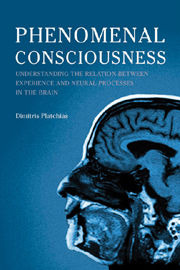Book contents
- Frontmatter
- Contents
- Acknowledgements
- Miscellaneous Frontmatter
- Introduction
- 1 The nature of the mind
- 2 Phenomenal consciousness: the hard problem
- 3 Phenomenal consciousness and the “sufficiency” claim
- 4 Experience and first-order representationalism
- 5 Experience and the explanatory gap
- 6 Experience and higher-order representationalism
- Notes
- Bibliography
- Index
4 - Experience and first-order representationalism
- Frontmatter
- Contents
- Acknowledgements
- Miscellaneous Frontmatter
- Introduction
- 1 The nature of the mind
- 2 Phenomenal consciousness: the hard problem
- 3 Phenomenal consciousness and the “sufficiency” claim
- 4 Experience and first-order representationalism
- 5 Experience and the explanatory gap
- 6 Experience and higher-order representationalism
- Notes
- Bibliography
- Index
Summary
INTENTIONALITY, EXPERIENCE AND REPRESENTATIONALISM
According to dispositionalists, we experience our first-order states by virtue of a certain kind of dispositional role that these states have. Dispositionalists claim that no higher-order state is required for a first-order state to be actually conscious, but only the potential to generate a higher-order state. According to the dispositionalist view, first-order experiences are first-order states that meet certain conditions. On this account, there is still a necessary tie between mental qualitative properties and experience. But it appears that there is a difference between such accounts and accounts such as those of Block and Chalmers. With respect to our sensory states, for example, according to the dispositionalists there is an extra element (i.e. a dispositional role functionally defined) that makes our sensory states conscious. On this view, one can still maintain that whereas no distinct higher-order state is necessary for first-order experiences, there is still a distinction to be made between conscious and unconscious sensory qualities. In other words, not all qualitative states possess Nagelian “what-it-is-likeness”: they must meet certain specifiable conditions.
In this chapter, I shall consider the dispositionalist approach to experience. Since these dispositionalist accounts are typically intentionalist or representationalist, I shall start my discussion by making a few remarks on the relation between the notion of intentionality and contemporary representationalism. Representationalism should not be confused with the traditional representational theory of perception, according to which we perceive physical objects and properties indirectly in virtue of being directly aware of some sensory or mental items that represent the physical objects and their properties.
- Type
- Chapter
- Information
- Phenomenal ConsciousnessUnderstanding the Relation between Neural Processes and Experience, pp. 93 - 126Publisher: Acumen PublishingPrint publication year: 2010



